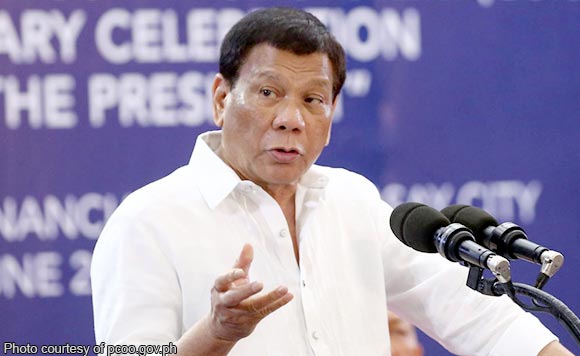A JOINT committee of the House of Representatives approved last March 24, 2021, four amnesty proclamations by Pres. Duterte aimed at hastening the return to mainstream society of the members of the 4 major armed groups that have failed to topple the government thru armed struggle.
Oddly, however, only the representatives of the ‘Makabayan Bloc’ in Congress present during the hearing, Rep. Carlos Zarate of Bayan Muna and, Rep. Arlene Brosas, voted ‘No’ in the grant of amnesty for the members of the Communist Party of the Philippines, the New People’s Army and the National Democratic Front of the Philippines (CPP-NPA-NDF), which have been lumped under the description, ‘Communist Terrorist Groups’ (CTGs) in one of the proclamations.
The majority of the committee members also decided to include the NDFP in the CTG category despite the opposition from Brosas and Zarate, after noting that the NDFP is the communists’ official representative in peace talks with the government.
The House concurrence to the President’s proclamations came during the joint hearing of the House Committee on Justice chaired by Leyte third district Rep. Vicente Veloso III and House Committee on National Defense and Security chaired by Iloilo Rep. Raul Tupas.
Brosas and Zarate joined the hearing as members of the House minority bloc.
The passage of the amnesty has become a foregone conclusion, with no less than House Majority Leader, Leyte first district representative, Ferdinand Martin Romualdez, House Speaker and Marinduque representative, Lord Allan Velasco and, Minority Leader, Rep. Joseph Stephen Paduano of Abang Lingkod Partylist, filing four concurrent resolutions in support of Pres. Duterte’s decision the day the joint hearing convened.
The Chief Executive last February 5, 2021, signed presidential proclamation (PP) 1090, 1091, 1092 and 1093 and covered crimes committed by the 4 armed groups under the Revised Penal Code and other special laws.
Under Section 19, Article VII of the 1987 Constitution, the President has the power to grant amnesty with the concurrence of majority of all members of Congress.
The crimes that are covered by the amnesty include rebellion or insurrection, conspiracy and proposal to commit rebellion or insurrection, disloyalty to public officers or employees, sedition, illegal assembly, illegal association, direct assault, indirect assault, among others.
The grant of amnesty does not cover those charged with kidnapped for ransom, massacre, rape, terrorism, violation of Comprehensive Dangerous Drugs Act of 2002, and violation of Geneva Convention of 1949.
The amnesty also excludes those who committed genocide, crimes against humanity, war crimes, torture, enforced disappearances, and other grave violations of human rights.
PP 1090 covers members of the Moro Islamic Liberation Front (MILF) while PP 1091 are for the members of the Moro National Liberation Front (MNLF). The MILF is a breakaway faction of the MNLF.
The amnesty for both groups was supported by Concurrent Resolution No. 12 and No. 13, respectively.
On the other hand, PP 1092 covers the members of the Rebolusyunaryong Partido Manggagawa ng Pilipinas, Revolutionary Proletarian Army and the Alex Boncayao Brigade and (RPMP/RPA/ABB) and is supported by Concurrent Resolution No. 14.
The RPMP/RPA/ABB was a product of the split within the CPP-NPA leadership in the early ‘90s.
Meanwhile, PP 1093 refers to the members of the CPP-NPA described in the proclamation as ‘CTGs’ (communist terrorist groups) and is supported by Concurrent Resolution No. 15.
It was only the grant of amnesty to the members of the CPP-NPA-NDFP that was opposed by Brosas and Zarate, as well as the House’s adoption of the term, ‘communist terrorist groups’ (CTGs) in describing them, as already being used by the government and the military for several years now.
Brosas, a minority member of the House justice committee, claimed PP 1093 would be used to “step up the fake surrender of rebels and increase Red-tagging of government critics,” a claim that was dismissed by majority of her colleagues in Congress.
“We are one with President Rody Duterte’s efforts to attain peace and reconciliation in the country. We recognize this crucial need to accept the request of former combatants for amnesty so we could further stabilize our country and move towards healing, reconciliation, and reintegration,” Romualdez said in a statement.
“We commit that the House of Representatives, under the leadership of Speaker Lord Allan Velasco, will work towards the timely adoption of these amnesty resolutions in line with the government’s peace program,” he added.
The same day that Pres. Duterte signed the amnesty proclamations, presidential spokesman Harry Roque added the Chief Executive also signed an executive order creating a ‘National Amnesty Commission,’ composed of seven members.
The body would be composed of a chairperson and two regular members to be appointed by Pres. Duterte.
On the other hand, the secretaries of the Department of Justice, Department of National Defense, Department of Interior and Local Government, and the Office of the Presidential Adviser on Peace, Reconciliation and Unity will serve as ex-officio members of the commission, Roque added.



